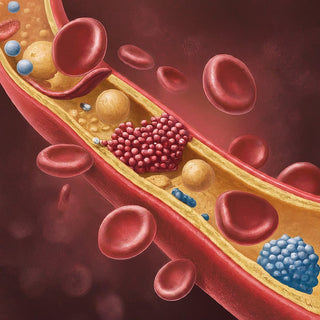Cholesterol: chances are you've heard the term before, but what exactly is it, and how does it affect your health? Cholesterol is a waxy substance found in your blood. It plays a vital role in building healthy cells, but just like many things in life, too much of a good thing can be bad. High cholesterol levels, particularly high LDL cholesterol, can increase your risk of heart disease, the leading cause of death globally [1].
The Balancing Act: HDL vs LDL and Triglycerides
Think of cholesterol like different delivery trucks in your bloodstream. There are three main types to consider for a healthy heart:
- LDL (low-density lipoprotein): Often referred to as "bad" cholesterol. LDL carries cholesterol to your arteries, where it can build up and form plaque. This plaque buildup narrows the arteries, making it harder for blood to flow through, increasing your risk of heart attack and stroke.
- HDL (high-density lipoprotein): The "good" cholesterol. HDL acts like a recycling truck, picking up excess cholesterol and taking it back to your liver, where it's broken down and eliminated from your body.
- Triglycerides: Another type of fat carried in your bloodstream. While some triglycerides are normal, having high triglycerides along with unhealthy cholesterol levels can significantly increase your risk of heart disease.
The key to a healthy heart lies in maintaining a healthy balance between these.
What Affects Your Cholesterol Levels?
Several factors can influence your cholesterol levels, including:
- Genetics: Some people are genetically predisposed to higher cholesterol.
- Diet: A diet high in saturated and trans fats (found in fried foods, processed meats, and some baked goods) can increase LDL cholesterol. Conversely, healthy fats (found in fish, avocados, and nuts) and soluble fiber (found in oats and beans) can help lower LDL and raise HDL levels.
- Lifestyle: Physical inactivity and smoking can contribute to high cholesterol.
- Weight: Carrying excess weight can raise your LDL levels and lower your HDL.
- Other health conditions: Certain medical conditions like diabetes and high blood pressure can also impact cholesterol.
The Risks of High Cholesterol and Triglycerides
High cholesterol and triglycerides often have no symptoms, but they can silently damage your arteries over time. Here's how they contribute to some heart-related issues:
- Heart disease: Plaque buildup in arteries due to high LDL cholesterol can restrict blood flow to the heart, increasing the risk of a heart attack.
- Stroke: If a blood clot blocks a blood vessel in your brain, it can lead to a stroke.
- Atherosclerosis: This is the general term for the hardening and narrowing of arteries due to plaque buildup.
Understanding Your Lipid Panel
A simple blood test called a lipid panel can measure your cholesterol levels, including:
- Total Cholesterol: This is the sum of all your cholesterol, including LDL, HDL, and triglycerides.
- LDL Cholesterol ("bad")
- HDL Cholesterol ("good")
- Triglycerides
Taking Control of Your Heart Health
The good news is that high cholesterol and triglycerides are often treatable conditions. A doctor can review your lipid panel results and recommend personalized steps to keep your heart healthy. This may involve lifestyle changes like a heart-healthy diet, regular exercise, and maintaining a healthy weight. Sometimes, medication might be recommended to lower LDL levels or triglycerides.
By understanding cholesterol and triglycerides and taking proactive steps to manage them, you're on the path to a healthier heart and a longer, more fulfilling life. Follow the next blog from Condition Directed Health Empowering Yourself to Manage High Cholesterol.
References:
- [1] World Health Organization. The top 10 causes of death: https://www.who.int/news-room/fact-sheets/detail/the-top-10-causes-of-death
- [2] American Heart Association. Understanding Cholesterol: https://www.heart.org/en/health-topics/cholesterol/about-cholesterol
- [3] Mayo Clinic. High Cholesterol: https://www.mayoclinic.org/diseases-conditions/high-blood-cholesterol/symptoms-causes/syc-20350800
